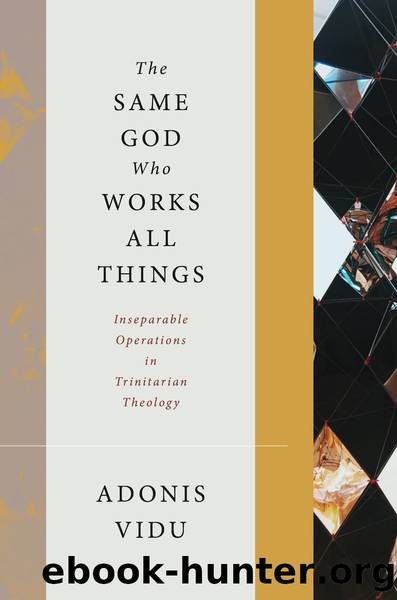The Same God Who Works All Things by Vidu Adonis;

Author:Vidu, Adonis;
Language: eng
Format: epub
Publisher: Wm. B. Eerdmans Publishing Co.
Published: 2021-11-15T00:00:00+00:00
DOES CHRISTâS HUMANITY REVEAL THE SON?
The first objection we have taken up concerns the ontological dimension of the incarnation: Shouldnât immediate actions of the Son be required by the fact that the incarnation terminates in the Son? In response to this it was pointed out that the category of terminus does not function to individuate the various roles of the divine persons within divine actions. The second objection we have to consider is of an epistemological sort. The worry is expressed that if the human nature of Jesus Christ is merely an effect of the common triune causality it therefore remains extrinsic to the Son himself, considered in his personal distinctiveness, and therefore it cannot possibly be the medium of the revelation of the Son.
It was already noted that this epistemological consideration lies behind much of the sentiment against hard inseparability in modern theology. Robert Jenson writes:
The Augustinian supposition that there is no necessary connection between what differentiates the triune identities in God and the structure of Godâs work in time bankrupts the doctrine of the Trinity cognitively, for it detaches language about the triune identities from the only thing that made such language meaningful in the first place: the biblical narrative.32
In Jensonâs view the pattern of relationships between the divine persons that the biblical narratives exhibit must have a ânecessary connectionâ to that which differentiates the personal identities of Father, Son, and Spirit. He believes the Augustinian principles confine the revelation of the divine persons to a strictly propositional level of what the Scriptures assert. However,
When logically detached from the biblical triune narrative, the Nicene-Cappadocian propositions about the immanent Trinity become formulas without meaning we can knowâ¦. But meaningless forms of words, or forms of words whose meaningfulness is posited but declared unknowable by us, can be recited but cannot be put to any other use. If propositions about Godâs immanent triunity are denied cognitive content, they cannot function in the life of the church or elsewhere in the system of theology.33
The concern for the divine transcendence is so overbearing for Augustine, in Jensonâs view, that he is prevented from taking seriously the unfolding of the personal identities taking place in the Scriptures. The problem is compounded, as we have previously noted, by Aquinasâs claim that any of the divine persons might have become incarnate. Aquinas writes that âthe Divine power could have united human nature to the Person of the Father or of the Holy Ghost, as It united it to the Person of the Son. And hence we must say that the Father or the Holy Ghost could have assumed flesh even as the Son.â34
Rahner has serious reservations about the implications of this position. We shall quote him at length:
If we admit that every divine person might assume a hypostatic union with a created reality, then the fact of the incarnation of the Logos ârevealsâ properly nothing about the Logos himself, that is, about his own relative specific features within the divinity. For in this event the
Download
This site does not store any files on its server. We only index and link to content provided by other sites. Please contact the content providers to delete copyright contents if any and email us, we'll remove relevant links or contents immediately.
Never by Ken Follett(2873)
The Man Who Died Twice by Richard Osman(2290)
Machine Learning at Scale with H2O by Gregory Keys | David Whiting(2267)
Fairy Tale by Stephen King(2058)
Will by Will Smith(2033)
Reminders of Him: A Novel by Colleen Hoover(1870)
Rationality by Steven Pinker(1761)
The Stranger in the Lifeboat by Mitch Albom(1529)
The Becoming by Nora Roberts(1324)
Friends, Lovers, and the Big Terrible Thing by Matthew Perry(1324)
New Morning Mercies: A Daily Gospel Devotional by Paul David Tripp(1301)
A Short History of War by Jeremy Black(1295)
HBR's 10 Must Reads 2022 by Harvard Business Review(1251)
The Strength In Our Scars by Bianca Sparacino(1234)
The Fall of Babel by Josiah Bancroft(1232)
Can't Hurt Me: Master Your Mind and Defy the Odds - Clean Edition by David Goggins(1223)
515945210 by Unknown(1205)
Fear No Evil by James Patterson(1106)
Love on the Brain by Ali Hazelwood(1088)
